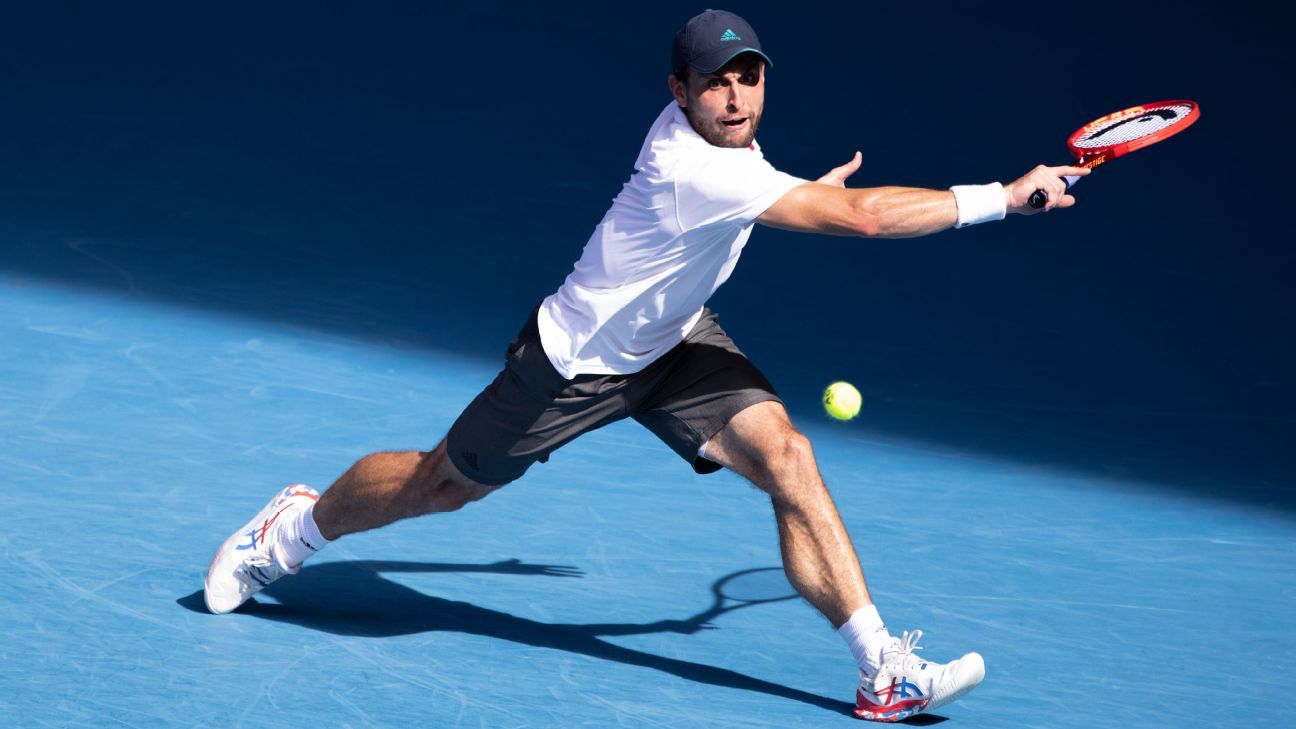When Aslan Karatsev takes the court on Thursday against world No. 1 Novak Djokovic at the Australian Open (3:30 a.m., ESPN/ESPN App), he will make history as the first man in the Open era to make the semifinals in his major debut and as the lowest-ranked player to reach that round at the event since Patrick McEnroe in 1991.
The 27-year-old Karatsev, who entered the tournament ranked No. 114 with just three tour-level wins in his career, has stunned the tennis world with his implausible path to the final four, which has included upset victories over Diego Schwartzman, Felix Auger-Aliassime and Grigor Dimitrov.
While having played mostly in Challenger events, he is now set for the biggest match of his career as he will try to do the impossible against the 17-time major champion.
So how does the ultimate underdog get mentally ready for a potentially career-defining moment? What is it like being in the midst of such an improbable Cinderella run?
There is one man who knows exactly what Karatsev will be feeling under the bright lights on Rod Laver Arena. Now an analyst for ESPN covering the 2021 tournament, McEnroe remembers his dream trip to Melbourne well 30 years later.
Unlike Karatsev, who came through last month’s qualifying event in Doha, McEnroe, also ranked No. 114, was the last direct acceptance into the main draw after several players withdrew. Confident in his abilities and bolstered by his preseason training in Hawaii with his brother John and their friend Eric Heiden, the five-time Olympic gold medalist in speed skating, McEnroe believed he could win some matches, but even he didn’t see himself making it to the semifinals.
Heck, he didn’t even have a coach at that point and was sharing an apartment near the grounds with two other American players, who both lost in the first round.
“I was totally on my own, ordering takeout every night and drinking gallons of liquids all night,” he said this week in between calling matches.
He nearly joined his roommates with an early exit as he struggled in his opener against Thomas Hogstedt on a particularly sweltering day in the Australian summer sun. Trailing two sets and a break, he managed to fight back and capitalize on Hogstedt’s issues with the heat and humidity. The comeback victory changed everything.
“That gave me tons of confidence in the conditions down there,” McEnroe said. “So away I went. I was lucky with a good draw and took advantage of it. I thought I belonged there and just played every match.”
Simultaneously playing in the doubles draw with David Wheaton, his self-belief was furthered by their success as they advanced together to the final. The confidence and momentum carried over into singles play with a straight-set third-round win over No. 12 seed Jay Berger on the way to the quarterfinals.
Taking on Cristiano Caratti, who was also having a career-best run and in an equally unfamiliar position, the two battled for five sets before McEnroe came out on top. Much like Karatsev’s meeting against a huge favorite, McEnroe earned a semifinal clash against Djokovic’s former coach, Boris Becker, then the winner of six major titles. He knew it would be an uphill battle, but he felt their games matched up well.
Winning the first set in a tiebreak was the first time McEnroe let himself believe he could actually beat Becker and advance to the Australian Open final.
“I would tell Karatsev to keep playing his game and do what he’s been doing. [Take it] point by point. Focus on this match, not the bigger picture, which was my mistake.”
ESPN analyst Patrick McEnroe
That was the moment he now believes resulted in his undoing. Becker, the seasoned veteran, seized on McEnroe’s distraction and won the match 6-7, 6-4, 6-1, 6-4. He went on to win the tournament for his first Australian Open title.
McEnroe left Melbourne empty-handed, coming up short in the doubles final as well, and says he lost 12 pounds after the intense fortnight playing in singles and doubles. The semifinal result ended up being the best major result of his 10-year professional career, and the memories remain.
Regardless of what happens against Djokovic, Karatsev will see his ranking skyrocket — from No. 114 to inside the top 50 for the first time — and his tour earnings will more than double with a $662,000 payday for reaching the semis. He has been surprisingly subdued about his recent success, at least when speaking to the media, and seems to be squarely focused on staying positive and in the present.
“I try to believe every match what I’m doing on the court, and it’s helped me to win matches,” Karatsev said after his win over Dimitrov in the quarterfinals. “I arrive to the court and say, ‘OK, I [will] try to do my best, and with more belief.’ I would describe [it] like that.”
McEnroe believes that’s exactly what Karatsev should be doing. In fact, his only advice for him is to avoid falling into the same trap that he did against Becker.
“I would tell Karatsev to keep playing his game and do what he’s been doing,” he said. “[Take it] point by point. Focus on this match, not the bigger picture, which was my mistake.”
